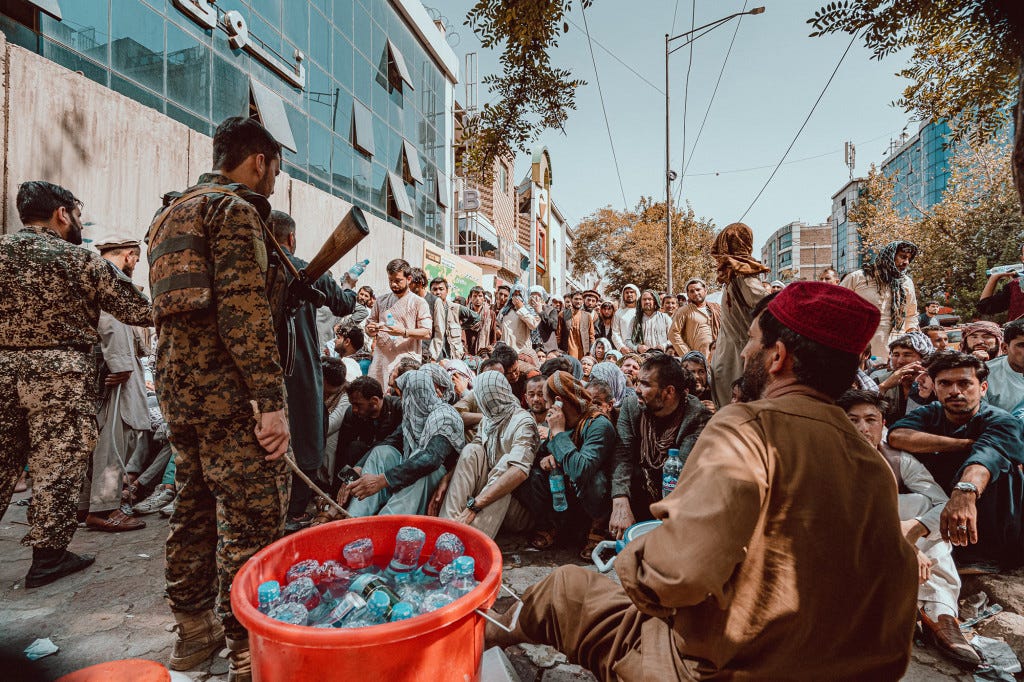“Whatever countries I conquer in the world, I would never forget your beautiful gardens. When I remember the summits of your beautiful mountains, I forget the greatness of the Delhi throne.”
Ahmad Shah Durrani, Founder of the Afghan Empire, (1747-1773).
It has been another whirlwind, heartbreaking and heart-rendering week documenting the “new epoch” that is Afghanistan. Yesterday marked one month since the Taliban took control of Kabul. While Afghans are some of the most resilient humans I have ever met, the state of the economy and the freefall into poverty is haunting to observe.
While Afghanistan may no longer headline news the way it was just a few weeks ago, I still feel very deeply committed to staying and documenting this strange new time. What is interesting to me is that even though a lot has changed over the past few weeks, a lot has also remained the same. I would describe the country as being in a kind of limbo period. Until the government is fully formed, and the leadership and religious scholars determine the do’s and don’ts of their interpretation of Shariah Law – Afghans remain in a holding period.
For now, the focus is on being able to feed their families. And with a drastic hard cash shortage, I fear this is becoming a Sisyphean task.
When you talk to many Afghans, they speak in epochs defined by lives in perpetual conflict. There was the time of the Soviets and the ensuing civil war, the time of the Taliban and the time of the United States. Now, it’s the time of the Talibs again — only it is plagued by more uncertainty, more anxiety and a nagging worry that they could all plunge into poverty atop it all.
If you are interested in learning more about the aftermath of war, please pick up a copy of my book “Only Cry for the Living: Lessons from Inside the ISIS Battlefield.”
THE TRANSFORMATION OF KABUL, ONE MONTH AFTER THE TALIBAN TAKEOVER
At the outset, the capital appears as though it is almost coming back to life: wooden carts overstuffed with fruits for sale underneath the searing sunshine, beaten-down cars clogging the dusty streets, beggars reaching out to grab your arm from behind the blue burqa and the smells of fresh kebabs and diesel mixing into a strange yet familiar scent.
But behind the weathered faces, the bustle and the stalls brimming with bread exists a dramatically transformed country in limbo.
Despite the announcement of a partial interim government last week, many services — which were propped up by foreign aid over the past two decades — have not been reinstated, given the government cannot govern without money. Most ministries you visit are without personnel, except for the few armed fighters who sit haplessly in the heat outside.
Every Talib you encounter is different. There is no one-size-fits-all. Some still roam with kohl-rimmed eyes and traditional dress and look as though they are far from home in the urban landscape, still clutching an M-4 close as if ready for battle. Others have reformed their image to don an Afghan Security Forces uniform slapped with a freshly embroidered Emirate patch. Some take the Pashtunwali code of hospitality for foreigners very seriously, offering tea and sweets during meetings; others are abrupt and bark orders not to speak to the people and demand to see identification.
Most won’t make eye contact or acknowledge me — as a woman — but occasionally, you will find one who looks me dead in the face.
However, the Taliban foot soldiers outside government buildings are everywhere — they roll through the streets in armored US trucks with American weapons strapped to their backs, their flags flapping high on almost every government building, street corner and institution. Afghans no longer blink an eye, having quickly adapted to the new ruling class around them.
Yet there is a strange sense of law and order that comes with their imposing presence.
“Security-wise, it has been perfect. There have been no robberies, no kidnappings, nothing. Before, we could not walk around. Criminals with guns would take our mobile phones and money, and everything,” says Fazal Mohammed, 55, who has owned his barbershop for 35 years. “Now, there is none of that.”
Mohammed notes that the Taliban have yet to issue any formal decree on whether men must grow their beards as they were forced to do during their last reign, which would ultimately hurt his business. Yet he weathered it last time and vows to struggle through it again.
Taliban members have been in themselves to be groomed, and while Mohammed typically charges the equivalent of around $3 for a cut, he says the Talibs put just $1 on the table and leave.
You still see occasional acts of rebellion, such as smoking cigarettes in the street, and men wandering in skinny jeans and a fake Western designer shirt. And you still do see visceral signs of people clutching onto the past and moving forward all the same.
“You want to buy a Taliban flag?” another child, who appears about 8 with his sun-touched face and light eyes, asks as our taxicab comes to a halt in the gridlock traffic.
His determined face cracks into an almost cheeky smile.
“Or you want this one?” he continues, pulling out the red, green and black flag that one month ago still flew atop the Presidential Palace.
READ MORE ABOUT KABUL’S TRANSFORMATION ONE MONTH AFTER THE TAKEOVER
TALIBAN BRING BACK ‘VIRTUE’ MINISTRY, STONING AND AMPUTATIONS FOR ‘MAJOR SINS’
The Taliban’s reinstatement of the Ministry for Propagation of Virtue and Prevention of Vice — which was abolished following the US occupation — sent a collective shudder through many Afghans, who remembered it for its strict interpretation of Islamic law.
“The main purpose is to serve Islam. Therefore, it is compulsory to have Ministry of Vice and Virtue,” Mohammad Yousuf, who says he is around 32 years old and responsible for the “central zone” of Afghanistan, tells me from inside his Kabul office on Monday. “We will punish as per the Islamic rules. Whatever Islam guides us, we will punish accordingly.”
Actions will be taken on the “major sins of Islam,” such as sexual intercourse outside marriage, killing someone, and theft, he said.
“Islam has its rules for major sins. For example, killing someone has different rules. If you do it intentionally, if you know the person and intentionally kill the person, you will be killed back. If not intentional, then there might be another punishment like paying a certain amount of money,” Yousuf continues. “If there is a theft, the hand will be cut off. If there is illegal intercourse, they (violators) will be stoned.”
He claimed that both the male and female miscreants would be executed in the draconian manner, although stoning has previously been the group’s mode of punishment for women. Yousuf says four witnesses are required, and those witnesses “should all have the same story.”
READ MORE ABOUT THE FEARED REINSTATED NEW MINISTRY HERE
DISPATCH: WITH AN ARSENAL OF US-MADE WEAPONS, THE TALIBAN STORM THROUGH PANJSHIR
This valley has long been a place of military mythology. Panjshir was the pivot point, the legend goes, that repelled the Soviet invaders in the 1980s and the only province not to fall to the Taliban in the 1990s. It was the lone, majestic parcel of peace throughout the US-led war of the 2000s.
And it was hoped that it would be a final frontier of anti-Taliban resistance following the dizzying Taliban takeover in 2021.
But from where I sit, traveling through all eight districts of the prized Panjshir Valley, the Taliban dominance through the main thoroughfares is absolute. Some 8,000 fighters belonging to the former insurgency oversee the main roads and infrastructure. White-and-black flags flutter high on billboards and government buildings, mosques, and abandoned market squares.
While the local National Resistance Front is said to still be battling it out in caves and crevices in and around the distant mountains, it is evident that they face a chilling fight against American-made weapons inherited from the defunct Afghan National Army. The Taliban roll through the winding tracks, primarily wielding American M4-style rifles and the occasional SAW and PKM. Several .50-caliber machine guns are also hoisted on the back of trucks. Some Taliban possess armored vehicles, and others have small, battered cars still emblazoned with stickers of the famed leader who last threw them back: Ahmad Shah Massoud, the “Lion of Panjshir” whom al Qaeda assassinated in 2001, two days before the 9/11 attacks.
Taliban leaders repeatedly make their point clear: Surrender, or we use force.
READ MORE ABOUT THE US ROLE IN PANJSHIR HERE
AFGHANISTAN ON BRINK OF ECONOMIC COLLAPSE AS CASH CRISIS DEEPENS
Ever since the Taliban took over Afghanistan’s capital on Aug. 15, the country’s already fragile economy has spiraled into despair.
Foreign assistance, which previously propped up the nation of 38 million, was immediately frozen. The US halted $9.4 billion in reserves to the country’s central bank. The International Monetary Fund and World Bank have also halted loans, and the Financial Action Task Force, the France-based global terror-funding watchdog, warned its 39 full member nations to block Taliban assets.
With much of the international community refusing to recognize the Taliban regime, officially termed the Islamic Emirate of Afghanistan, hard cash is barely trickling in.
The currency has been crumbling, all while prices for essential goods have been soaring. And the financial crisis is fast morphing into a humanitarian catastrophe.
The United Nations this week pledged more than $1 billion in aid for Afghanistan, cautioning that 97 percent of the population could soon plummet below the poverty line, up from the pre-Taliban takeover figure of 72 percent.
Most Taliban members themselves are said not to have received money in months. As a result, a significant portion of foot soldiers in areas outside major cities subsist on little food and carry around thin blankets to sleep in trucks or wherever there is suitable shelter.
Sources tell me Taliban members get “sponsored” by community members who give them food and other needed supplies. They can also get handouts from commanders when they take over new areas or find cash.
Afghans come from miles away to wait in line for the opportunity to withdraw the equivalent of $200, the maximum any Afghan can take from their bank account per week given the drastic cash shortage the newly Taliban-controlled country is facing.
But the worse the economic impasse gets, the more unrest the Taliban will be forced to combat — peacefully or otherwise — as embattled Afghans push back.
READ MORE ABOUT THE PENDING ECONOMIC COLLAPSE HERE
IN AFGHANISTAN, MUSIC & MUSICIANS GO SILENT AS TALIBAN TAKES OVER
Hundreds of shining faces, sheathed in sequins and sparkles, filled a majestic wedding hall on Saturday night. Tiny girls through the adults and the elderly danced spiritedly into the early hours of the morning as traditional Afghan music blared through the speakers. The men – always seated in an adjacent hall where the two sides are divided by a wall as per cultural custom – also grooved through the night.
It was beautiful to see Afghans coming back to life for a wedding, a prominent staple of their lives, even amid the trying times of a Taliban takeover. Yet it was somewhat sad too.
“We always have live music at our weddings,” one male guest tells me outside as a storm brews – a clear sign that summer has given way to the winds of fall. “But there are no more musicians. Everyone has left.”
From where I sit, having spent weeks on the ground both before and after the country crumbled into Taliban control on August 15, the self-censorship and fear artists continue to endure is palpable. All the artists and journalists and filmmakers I knew have escaped or disappeared into the barren basements of their homes.
And the music industry is no exception.
While the top echelons of the Taliban – formally termed the Islamic Emirate of Afghanistan – claim that they are not the same stringent leadership that imposed harsh Shariah Law two decades ago, music is one aspect they have not let up on.
Music will not be allowed in public; spokesman Zabihullah Mujahid has vowed, adding that no official decree was needed.
The streets in the capital Kabul are slowly coming back to life, with more people flooding the markets and mosques and business centers and the ancient roads clogging fast with diesel-spewing motorcycles and old cars. Yet, the lack of tunes is jarring.
The Taliban has long deemed music a corrupting allure.
However, the Taliban does have its own installment of music, and it’s not uncommon to see fighters moving through the streets blaring a Nasheed, which are recordings of religious vocals-only songs. Live music and instruments have once again become a no-go zone.
READ MORE ABOUT THE LOSS OF MUSIC IN AFGHANISTAN HERE
And for one final observation, I am often asked how to tell the Taliban apart from regular Afghans given that most men now are dressing in the traditional Afghan dress clothes. It’s usually fairly easy to spot – hardened faces, beards, a sense of confidence. But ultimately, the biggest giveaway is that they are almost always armed – a U.S. issued weapon poking out from a sling.
Follow me on Instagram and Twitter for more updates
Photos courtesy of my brilliant photographer @JakeSimkinPhotos. Please consider a paid subscription to allow us to continue this work.



















Share this post